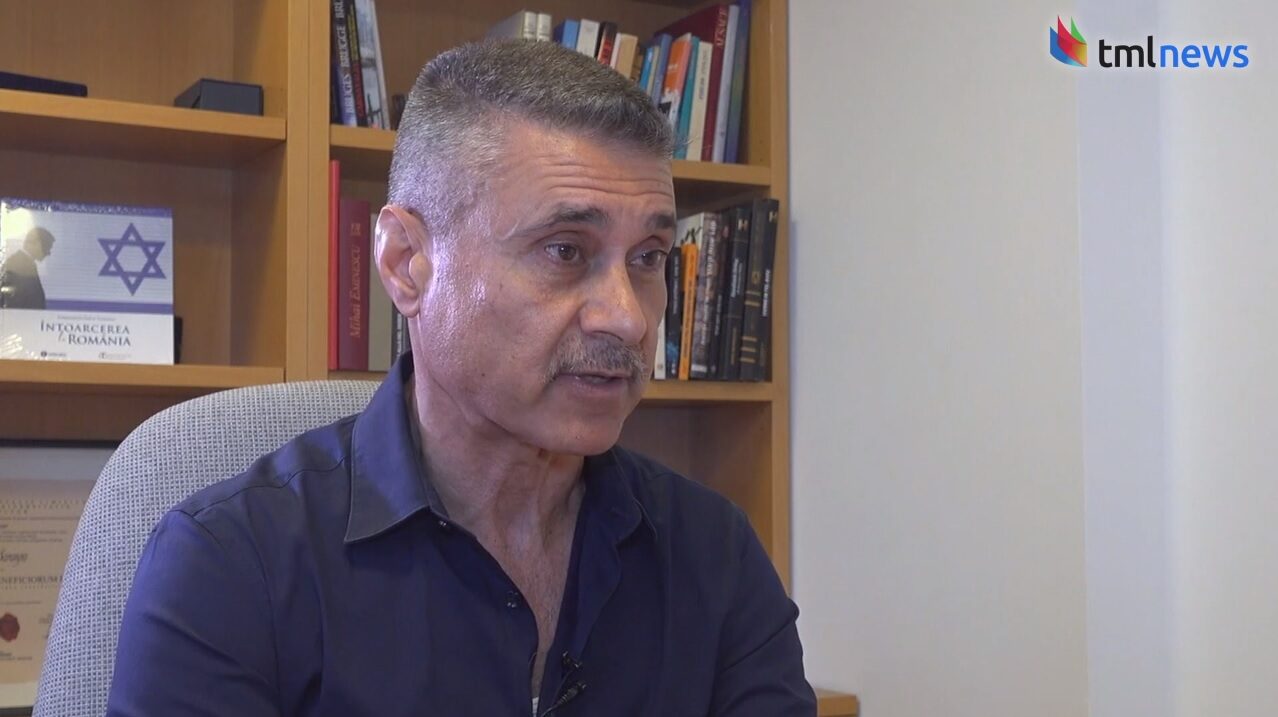Keyboard Warriors: Fighting for Israel’s Digital Story
The Foreign Ministry’s David Saranga and Sapir Levi tell The Media Line how Israelis are working to spread Israel's message and combat misinformation, and that while there is much negativity in the Arab world, there are also pockets of hope
Israel’s War Cabinet has identified two goals in its war with Hamas: bringing home the hostages and wiping out the leaders and infrastructure of the Iran-backed terrorist organization. With misinformation splattered all over the internet in real time, reaching mass audiences in multiple languages is a priority for Israel.
One of the critical underpinnings of the war has been the Arab world’s understanding of the conflict, and Israel is reaching out to Arab nations, ranging from those that have normalized relations with the Jewish state to those that outright seek its extinction. Twitter, TikTok, Facebook, Instagram, and LinkedIn are among the social engagement networks that are some of the most sophisticated tools of war today, and Israel and the Israeli people are battling for the message as never before.
David Saranga heads the Digital Division at Israel’s Foreign Ministry. A former Israeli ambassador to Romania and a senior foreign affairs adviser to then-President Reuven Rivlin, He also served as head of the European Parliament Liaison Department at the Israeli Embassy in Brussels and prior to that as consul for media and public affairs in the United States.
Saranga has had decades of experience in the branding of Israel and was the first diplomat to bring web channels into Israel’s governance initiatives.
He spent time with me at Israel’s Foreign Ministry in Jerusalem, describing the sophisticated web world, who his main targets are, and how his ministry is reaching out to Arab nations. He escorted me through the narrow hallways and cubicles that are the belly of operations of his department, where a team of seasoned social media experts are busy creating, designing, monitoring, and responding to the digital war of hearts and minds.
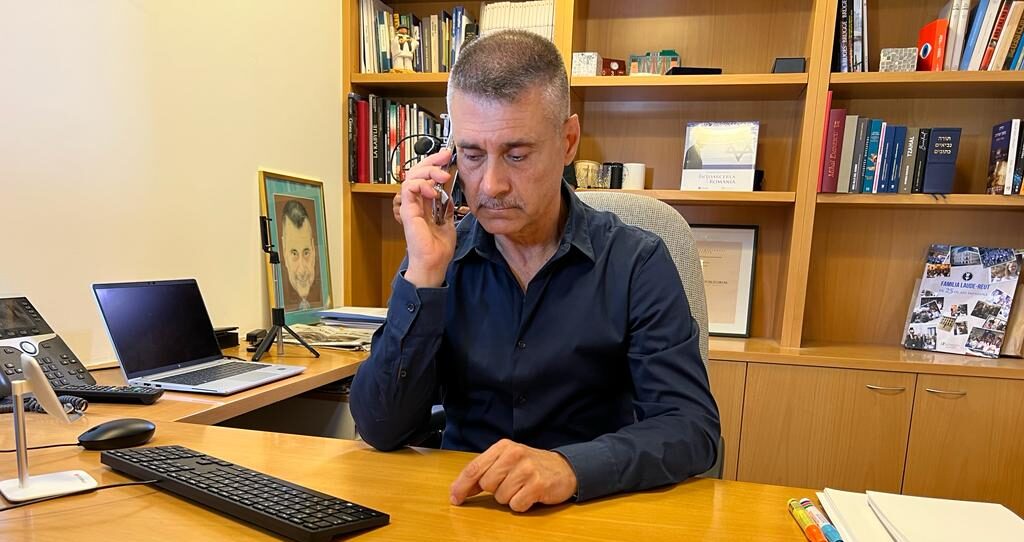
David Saranga, head of the Digital Division of Israel’s Foreign Ministry. (Felice Friedson/The Media Line)
There I also met with Sapir Levi, who heads the Arabic New Media Desk for Israel’s Foreign Ministry. With grandparents of Moroccan origin, she holds a degree in Middle Eastern studies and Arabic language and literature from the Hebrew University of Jerusalem and is completing a master’s degree in the same field.
The Media Line: David, thank you so much for joining me at The Media Line. The war has been going on for more than a month. There are different sides to the war. There’s the troops and the air force. Everyone talks about the land, the sea, the sky, everything. And yet, there’s also the digital war. A war that is fought in parallel with what’s happening on the ground. Here at the [Foreign] Ministry, you are heading this platform. Can you share with me, what does that mean?
David Saranga: What we are doing here at the department, or the division which deals with the online battle, we are trying to shape the narrative, because the battle today is not only on the ground in Gaza. It’s also the battle for the narrative in which the international community should understand what is going on in Israel, what is going on in Gaza, what happened during October 7. And this is what we are doing here.
In the Foreign Ministry, the division which deals with the digital diplomacy, we are on the one hand active, and I’ll explain to you later on which platforms, in six different languages: in English, in Arabic, in Persian, in Russian, in Spanish, and in Hebrew. But at the same time, we are coordinating the entire activity of our embassies abroad. We are talking about over 100 missions which are adapting the message to the local audiences.
TML: How do you choose languages? You know, you mentioned six. And there are other areas, whether it’s Italy or France.
David Saranga: You know, at the end, we all work under a certain budgetary restraint so Arabic is very important because of the region, first. Second, because of the Abraham Accords and the importance that we are giving to the Arab audiences.
Second, Spanish, we are speaking about more than 30 countries around the world, especially in Latin America, and we’re talking about countries which usually don’t consume news in other languages. English, it’s obvious.
We intend to start also French and German soon. We were supposed to start before the war, but unfortunately, the war started. But I hope it is something that will happen soon.
And of course, Persian is important and I know from what I can share with you is two things: first, that the Iranian regime is following very carefully our platforms in Persian first. And second, in the last year since the riots started, our platforms are also kind of a voice for the people of Iran.
We see that there is a big support for Israel among the people of Iran. And in recent polls, which we ran a few months ago, we saw that around 80% of the population have a positive sentiment towards Israel. So, overall, these are the languages in which we are active.
TML: David, let’s look at the other side. The Palestinians too are looking at digital media. What are the challenges that you have?
David Saranga: I can say that we have two main challenges when we are speaking about Israel and the Palestinians. First, numbers. We have to remember that there are 1.8 billion Muslims in the world who are spreading the message coming out of Gaza, compared to 15 million Jews in the world; supposedly they are active on social media.
When you compare the numbers, we start from a very difficult point. Second, many of the posts and the content which we see on social media from the Palestinian side, many of them are fake. And we are living in an era that we have to think about how we combat fake news.
Look, at the end of the day, I’m not trying to convince people who are against Israel, because I will not succeed. We have to concentrate our efforts first on the people who are in the middle who have no idea about what’s happening here in order to transmit the Israeli message or the Israeli narrative, and we also have to communicate with the people who are supporters of Israel because we want to give them that message of Israel. Because we want them to spread our message as well.
TML: What happens when Israel makes a mistake. You know, the 40 babies [beheaded] story is an example, and it happens. So, how do you respond to that?
David Saranga: You know, I saw the figures this morning. Since the beginning of the war, we published more than 10,000 posts and tweets, which is a very big number. And I remember three times in which we were mistaken, and every time that we were mistaken, three out of 10,000, first we either deleted the tweet or the post, second, we either apologized, or we republished the new one.
So we as a government, as an Israeli government, one of our core elements is to provide the public with accurate facts. Sometimes, we also make mistakes, but remember, it is three out of 10,000. On the other hand, on the other side, on the Palestinian side, it doesn’t go this way. They don’t check the facts at first. Second, sometimes they use images that are from the war in Syria in 2014, or they are using other elements in order to spread the fake news. And here, we are in a challenge.
TML: There are times, and I have seen it myself, where sometimes individuals themselves will spread things that are not from a current war, or you can’t validate [it] and it’s already out there, and that makes the message that much more difficult. And that is a challenge that I am asking as well. How are you combating the challenge of the public doing their own thing?
David Saranga: Look, at the end, the message which people see, read [and] consume on social media is not just the message of the Israeli government or the Palestinian Authority or the Hamas. There are also ordinary people. People who are posting things, and it makes the entire situation much more complicated, because it’s not that you are facing a few elements that you have to face. You are facing many elements, and we don’t necessarily have the answer for these challenges.
But on this note, I would like to add something very important. For many years, as someone who is dealing with the Israeli public diplomacy for many years, the Israeli public wasn’t that engaged with the public diplomacy or “hasbara” activity. Starting from this war, or starting from October 7th, we can see thousands of Israelis who took the initiative to bring the message of Israel to social media.
And we can see thousands of videos which they created tens of thousands of posts and tweets, and all of a sudden, we see that we have a large number of people putting out that content. And this is something that really helps.
And it helps not only amongst the Israelis. Every person who is on social media has also followers and friends from abroad, and when someone, who is not the government, someone that is an ordinary person that you know posts something, it’s much more reliable in many cases.
TML: TikTok has about a billion people who are siding with Hamas, and maybe with the Palestinians and not completely Hamas to the 200 million [followers] that might be siding with Israel, whether it’s Jews which is a very small number, and pro-Israel Christians.
David Saranga: Like-minded …
This holiday season, give to:
Truth and understanding
The Media Line's intrepid correspondents are in Israel, Gaza, Lebanon, Syria and Pakistan providing first-person reporting.
They all said they cover it.
We see it.
We report with just one agenda: the truth.


TML: Correct. OK, so here my question is, when looking at numbers, how do you measure success in such a sea of information?
David Saranga: When you talk [about] social media, the figures speak for themselves. For example, if we are talking about impressions, if we are talking about retweets, if we are talking about views, and so on and so forth, but it’s not only that. We also have to see who are the people who are retweeting and echoing your message, and something that I can say starting from October 7th we see many more voices in the West, in the International community, in Great Britain, in the United States, in Germany and many other places who are echoing our messages.
And when I post something on our platforms people might say OK, it’s the Israeli government, what can you expect, it’s the message of the Israeli government. But if someone who is an anchor on CNN, or he is a journalist in other media outlets, is posting something and saying something, then it has much more credibility because it’s much more authentic.
I can give you as an example the fact that the Israeli government together with the Foreign Ministry and the IDF, we screened the horrors of October 7th and the long version of 47 minutes to foreign journalists because we wanted them to see firsthand and to judge by themselves.
And the posts that they posted afterwards on social media with their experience, with what they passed through, with their feelings, I think is much more authentic than any other tweet or post which we, as a Foreign Ministry, are posting.
TML: The war is continuing. There is no sight of the war ending soon. You have a lot of work ahead. How do you see the shift? Because there are phases in this war as well, so what are the obstacles that you are about to face?
David Saranga: On October 7th, the first week, we could see how the world was shocked on the one hand, and showing sympathy for Israel on the other hand. As the time went by, we saw that people are starting to speak about what’s happening in Gaza. And later on, and this is the phase where we are now, there are people who are pro-Israeli who are speaking about the hostages. And we have to remember that [there are] 238 hostages, out of which more than 30 are kids, is something unheard of. And the fact that the Red Cross cannot visit them. We don’t even have their names. We don’t have any clue what is happening to them.
On social media we see a lot of activity around the hostages on the one hand, but at the same time we see also something which makes me very worried. We are seeing people who are denying the October 7th massacre the same way that we know that there are Holocaust deniers. And we’re seeing the same phenomenon.
When I speak with my colleagues, when I speak with my team, trying to think [about] what can we do in order to combat this phenomenon, and I think that there are two ways. First, it’s the platforms. Either it’s X, formerly Twitter, either it’s Facebook, either it’s Instagram, either it’s TikTok. They should act, because there is no difference between the Holocaust denier and the 7th of October massacre denier. It’s the same thing. That’s first.
Second, at the same time, we have to remember that the people in the world, and we’re seeing right now what’s happening in the United States with all of the anti-Semitic manifestations and with the woke culture and so on and so forth. We have to remember at the end that we as a Foreign Ministry, as diplomats, as embassies, we are targeting the opinion leaders.
We are targeting the movers and shakers of society. We are targeting the elite. We are targeting the academia, and we can’t fight on all fronts. We have to concentrate our efforts and to fight among people who are logical. People who know how to judge things whether something is bad or good. Either it’s right or wrong.
TML: You’re bringing up critical thinking, and in reality, here you are dealing with numbers, and a lot of people will say that there are so many people who have been killed on the Palestinian side, which in war, this is true. So, how does Israel avoid having the entire world coming down on them as the war has been playing out and continues and there’s no end in sight? And you’re trying to deal with the digital world telling them that it’s not as bad as you think what is happening.
David Saranga: First, what is happening in Israel is bad, is very bad. More than 1,200 who were killed, massacred in one morning, on one Shabbat morning. It’s a horror, first. Second, the fact that we have 238 hostages in the hands of Hamas not knowing what’s happening with them throughout [Gaza]. We are speaking of more than 30 kids. We are speaking about women and so on and so forth. This is bad. This is very bad.
And we should always stick to the facts, and the facts are that there was a cease-fire on October 6th. Hamas was the one who broke the cease-fire on October 7th. Now, calling again for a cease-fire I think it does not serve our interest, and it doesn’t serve the interest of the Western world, it doesn’t serve the interest of the free world, because what’s happening right now in Israel.
Let’s go to the year 2000. In 2000, the Second Intifada started and we saw here in Israel a new phenomenon of suicide bombers. People who committed suicide in order to kill Israelis on buses, in the market, in the restaurants, and so on and so forth. And very soon after that, this phenomenon was exported by the Islamic terrorists to Europe. We remember what happened in London. We remember what happened in Madrid. We remember what happened in many other capitals in Europe.
Why am I saying it? Because the brutality which we saw here in Israel on October 7th by Hamas, if we are not going to deal with it, unfortunately, sadly, sooner or later it might happen in other places in the world. And I think that it’s in the interest of Europe, it’s in the interest of the United States, to see that this phenomenon will not happen elsewhere.
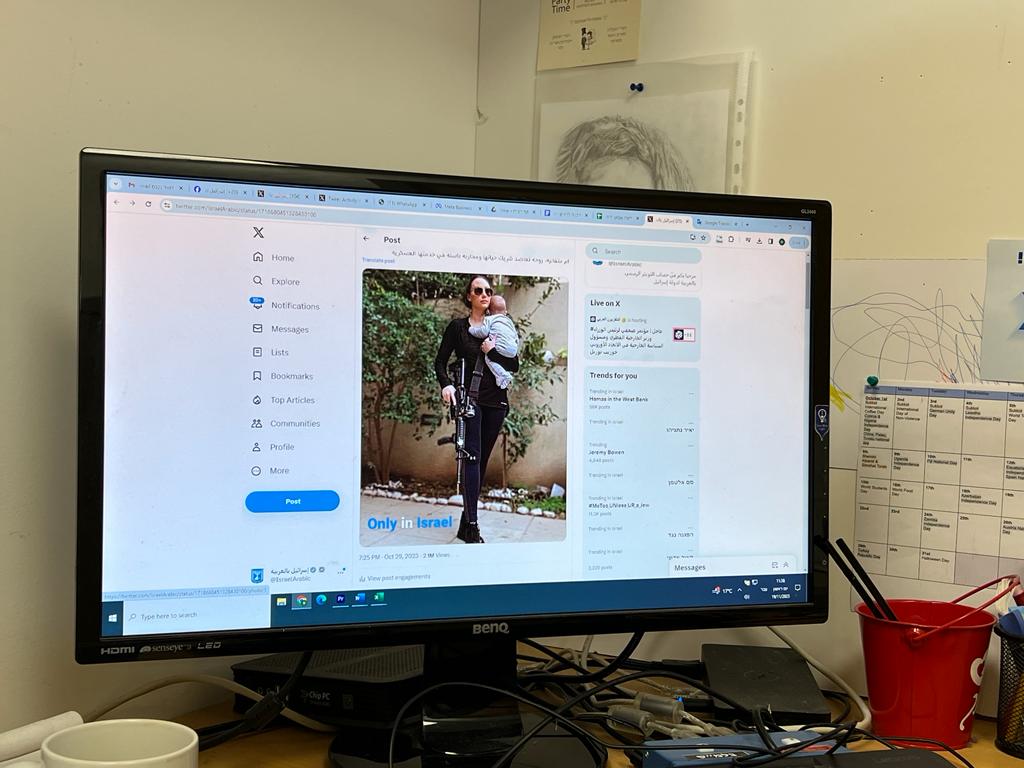
Twitter account of Israel’s Foreign Ministry, depicting a mother holding baby and a rifle. (Felice Friedson/The Media Line)
TML: David, how many people are working in the digital diplomacy department?
David Saranga: In total, we’re talking about 30 people who are working in the division. We have to remember that in each division we have people who are native speakers. The people who are doing English are from New York. The people who are doing Persian are from Iran. Arabic, of course. There are many native Arabic speakers. Spanish the same, because it’s not only the language, it’s also the culture.
Someone who is tweeting, someone who is posting, someone who is doing social [media], he has to also understand the culture of the people who are consuming our content.
TML: How much is done here in the [Foreign] Ministry, and how much is done elsewhere abroad?
David Saranga: If we are speaking about the six main languages in which we are active, it’s all done here at the ministry, but as I said, we have a lot of activity also at the embassies. We are talking about 100 embassies that are taking the content and are translating it and adapting the content to the local audience.
TML: Is it 24/7?
David Saranga: During the war it’s 24/7, and especially when I speak about our activity. Remember [there] are different time zones. During the war, people need answers, sometimes urgent answers if something is happening either in Israel or in Gaza. They have to know what are the facts and they need this information.
Here we are doing also all of the graphics and all of the design. You can see the people here working in the design. Either it’s about the hostages and the different activities which we are doing. Here, we have also a group of five students who are helping us, and since we work 24/7 part of them are here right now. Part of them are coming for a second shift.
From here, Sapir is handling all of the Arabic activity. Hi, Sapir!
TML: Incidents happen and news is instantaneous, so all of a sudden if you find yourself in an attack where Israel is blamed for mass casualties and you’re trying to get information out of what might have really happened, what really happens at that moment?
David Saranga: In order to know exactly what’s happening in Gaza, the IDF is the reliable source for us, so we don’t go online and we don’t post anything unless we got the confirmation from the IDF. They are on the ground, the IDF spokesperson. They know exactly what’s happening, and sometimes this might be a challenge. Sometimes we are waiting for half an hour, one hour, in order to make sure what happened. And we are not coming with our message [without clarification]. And on the other side, [the Palestinian side], they are coming with the lies and the fake news, but at the end, it’s our credibility.
And here it’s Yaki … who is in charge of all of the production. In the recent war, as I told you, there are many private initiatives in which they started to produce special videos, and we here at the ministry under the control of Yaki, we produce more than 200 videos which we posted online.
What are you dealing with right now? What is there? Look over there, for example.
Yaki: Yahya Sinwar, the military leader of Hamas. We are looking about doing some research about him and producing some video footage about the one who is leading all of this terrorist organization and violence.
David Saranga: You know, there are many facts that people around the world don’t know. They don’t understand that here we are talking about a murderer who is a psychopath, and many people [side with that]. We spoke before about the woke culture in the United States. Many people think that he is a freedom fighter. No! He is not a freedom fighter. He is a murderer who is responsible for murdering more than 1,200 people, among them babies, among them women, among them kids.
And he’s the one, the person who masterminded the entire attack. So, people should understand with whom we are dealing.
Sapir Levi tells TML how she reaches out to the Arab world.
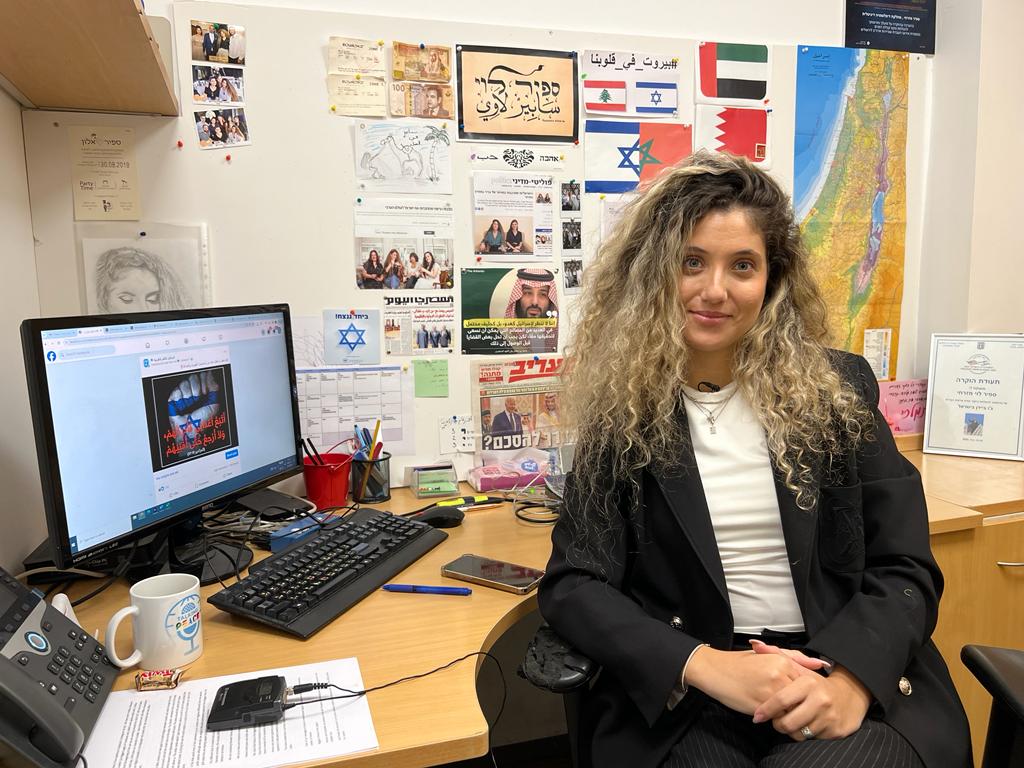
Sapir Levi, head of the Arabic New Media Desk for Israel’s Foreign Ministry. (Felice Friedson/The Media Line)
Sapir Levi: I am very passionate about Arabic, about Islamic culture, and this is very, very important to me to use my Arabic to build bridges between the Israelis and the Arabs around the world.
TML: What are the channels that the Foreign Ministry has?
Sapir Levi: We are running the social media accounts of the Foreign Ministry in Arabic. We are active on four platforms: Twitter/X, Facebook, Instagram and TikTok.
Since the beginning of the war, we are working 24/7 with tens of posts and tweets each day.
In all of our platforms in Arabic, we have reached more than 260 million. It’s really hard. We work so hard. This is a very big responsibility to share our knowledge and information on Israel to the Arab community.
Our biggest platform, our biggest account, is on Facebook, called “Israel Speaks Arabic,” with over 3 million followers from the Arab world. The Arabs from the Gulf states use X/Twitter platform to read information about political cases and Facebook and Twitter are the most popular channels in the Arab world.
This is our community, but although there’s a lot of followers most of them are negative, so it’s a big challenge for us to deal with.
I just want to show you something specific. Here you see a caricature of Iran that controls Hamas people, Hamas terrorists, and this is the kind of one piece that we shared with our audience. For us and the Arab community, the Houthis, Hizbullah and Hamas are proxies of Iran with the goal of destroying and destabilizing security in the Middle East.
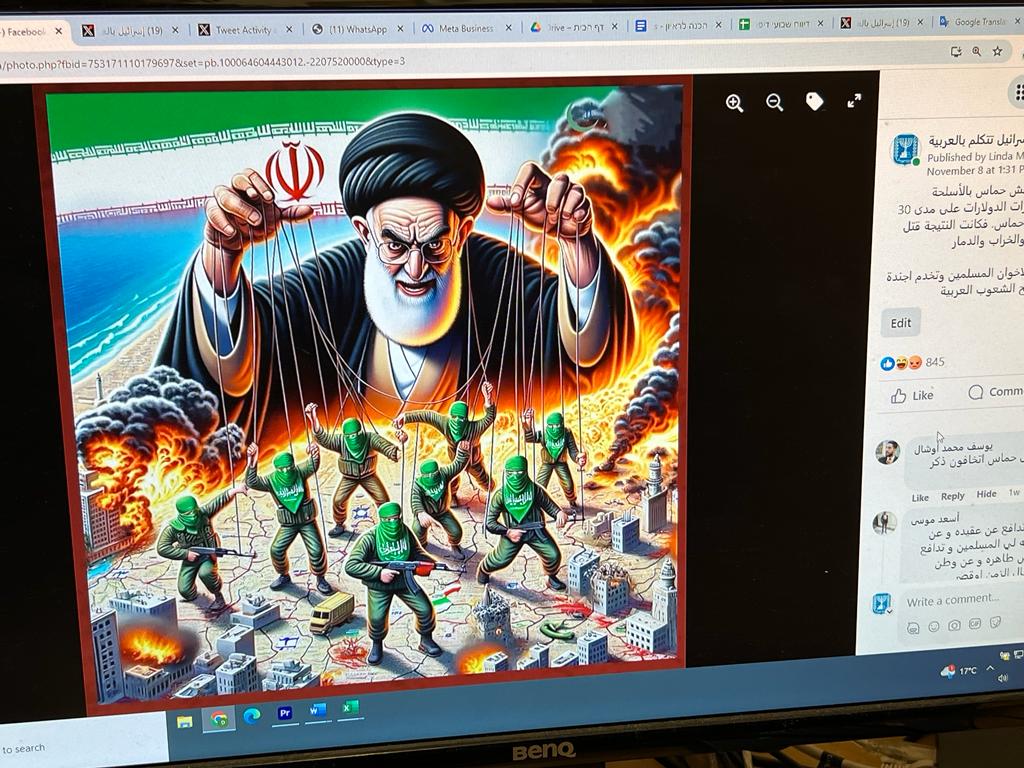
A caricature of Iran controlling Hamas as part of an Israeli campaign on social media. (Felice Friedson/The Media Line)
This is an account that is called October 7. This is an army of volunteers that prepares content to share about what happened in Israel, but we also have an artist that prepares for us caricatures. His name is Nimrod Reshef. This is a specific caricature he created for us. You can see here the Gaza Strip and this is the Palestinian boy that wants something to eat and the terrorists say to him, “Go to the United Nations and ask from them for something to eat.” And here you can see a tunnel and Hamas activists are stealing flour and gas from the population in Gaza.
TML: Are you surprised by any of the responses in the Arab world, and if so which countries?
Sapir Levi: First of all, you should remember that most of the Arab countries don’t share diplomatic relations with Israel so also the Arabic media doesn’t share information about Israel. In many cases, for instance fake news [is used], so social media is a tool to pass our message to the Arab community.
One successful campaign is called Voices of Peace. We are quoting bloggers and influencers from the Arab community, especially the Gulf states, and through those quotes the Arabs are sharing their support for Israel condemning Hamas and terror like Iran, Hizbullah, Houthi. This is very successful because most of the responses that we get are negative so these voices are very important to us and we want that the Arab community should hear these voices too.
TML: A vast amount of misinformation is floating through the web channels. Tell us how you deal with this phenomenon.
Sapir Levi: We are starting with the basic information like Hamas’ atrocities, and we share a lot of difficult photos and videos about what happened on October 7, because Al-Jazeera and other Arabic media don’t share this information, so we want to share this information about what really happened. Hamas killed people and burned them alive, raped women, and took hostages, elderly, and young people and women too. We want them to open their eyes about what really happened and we want them to hear our voice too.
TML: From nations other than the Abraham Accords that are interested in normalizing relations with Israel, where are you seeing a positive response?
Sapir Levi: Yes, a minority, but we can see voices that are sharing their support, condemning Hamas. Because Hamas harms Jews and Arabs alike. Hamas is investing its resources in weapons and terror and stealing from the population, and the Arabic community can relate with this content because it happened also in Lebanon with Hizbullah.
We see the voices from Saudi Arabia. There are a lot of comments from Saudi Arabia, not specifically about what happened on October 7, but condemning Hamas as a barbaric terrorist organization.
TML: Does anything surprise you?
Surprise me? Yes. We posted a lot of photos of Israeli women with weapons, but, like, [wearing] casual clothes. This is the reality now in Israel. Mothers go to the army now and take their weapons with casual clothes [on] and this was very successful content, because the Arabs are saying what, the Israeli girls are fighting? What happened here?
OK, you can see here a follower from Saudi Arabia. You can see his covered head. He writes “hero.” And you can see from the second comment that says she is an angel of death. OK. So it’s very charged.
We have a special account on Facebook, it’s called Israel in Iraqi Dialects. We don’t share diplomatic relations with Iraq, but it functions like a virtual embassy to the Iraqi community. You can see 100 percent of Iraqi followers from Iraq and abroad, and most of the comments are positive in Iraq.
I think I’m not surprised, because in the past there was a big Jewish community in Iraq, and the Iraqi people remember the good neighbors, the Jewish neighbors, and so I’m not surprised.
